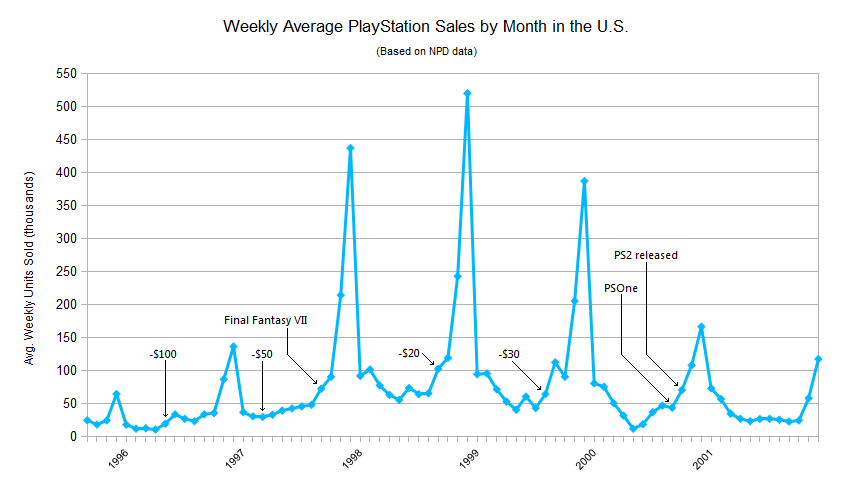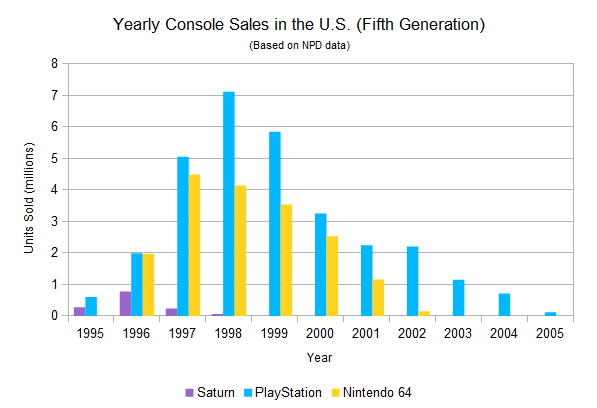Shadow1980 said:
Yeah, the Wii was down quite a bit for most of 2009. While it was up a good bit for January and February, it was down every month from March to November. For the whole March-Nov. period, it was down 40.5%. Even if you include January & February, it was still down 27.9% for the year by the end of November. Then December comes along with a huge YoY increase that causes 2009 to almost close the gap with 2008, with the year as a whole being down only 5.7%. But in 2010 the Wii started to decline very quickly. The Switch will probably never sell what the Wii did because of how well the Wii sold in the 2007-2009 period, but the Switch could have overall better legs.
Actually, the N64 had a rather modest decline of only 7.8% in 1998, though that decline did accelerate over time, with 1999 being down 14.5%, 2000 being down 28.5%, and 2001 (the GC's release year) being down a massive 54%, with the system having completely flat-lined in 2002. Also, the N64 was getting steady support from Nintendo & Rare and several third parties through 2000. The N64's problem was that the PS1 started to leave it in the dust, and that was because the PS1 utterly outclassed it in terms of third-party support, and that was a time when third-party games were predominantly exclusive to one system (multiplatform didn't start to become the norm until the following generation). Sure, the N64 had support from Acclaim, Activision, EA, Midway, LucasArts, and THQ, very few of those were titles with massive mainstream appeal, with wrestling games and Turok being about the only ones to perform well on the system. Meanwhile, the PS1 had Final Fantasy, Tekken, Tomb Raider, Resident Evil, Crash, Spyro, Driver, and a bunch of other games that never made it to the N64 (well, RE2 did get a belated N64 port...). Final Fantasy VII in particular was what propelled the PS1 to new heights. While the PS1 did see steady improvement from its initially dismal sales thanks in large part to being reduced to $200 in May 1996 and then to $150 in March 1997, it wasn't until FFVII was released in Sept. 1997 that its sales really took off.
|
I wouldn't count the Switch out just yet, though it will probably need a pricecut or revision to do so. But it keeps up more or less with the Wii 2009 despite a game drought, so I expect the second half of the year be very competitive. And then of course, with Pokemon this November will easily surpass the one of the Wii in 2009. However, to keep up with the Wii in 2009 it needs more than just Pokemon, it needs a pricecut and/or revision of the Switch.
The N64's other problem was probably that it was really a success only in the US, with the rest of the world rather choosing Saturn or PlayStation. That situation certainly didn't help with publishers, and the N64 already had less due to having been forced to keep the cartridges (since the deals with Philips and Sony fell trough and didn't have enough time for a third try), so less incentive to port games to the N64.
And poor Saturn in the US...
The Nintendo eShop rating Thread: http://gamrconnect.vgchartz.com/thread.php?id=237454 List as Google Doc: https://docs.google.com/spreadsheets/d/1aW2hXQT1TheElVS7z-F3pP-7nbqdrDqWNTxl6JoJWBY/edit?usp=sharing
The Steam/GOG key gifting thread: https://gamrconnect.vgchartz.com/thread/242024/the-steamgog-key-gifting-thread/1/
Free Pc Games thread: https://gamrconnect.vgchartz.com/thread/248138/free-pc-games/1/























